Photographs: Sean Gardner/Greenpeace/Handout/Reuters
A blown-out well of a sunken drilling rig in the Gulf of Mexico is threatening to be America's worst natural disasters in decades.
A drilling rig leased by the oil company BP exploded and sank off the Louisiana coast last week in roughly 5,000ft of water after burning for two days. Now a new leak has been discovered in the pipes a mile below the ocean's surface.
It is unclear how much of the estimated 700,000 gallons (approximately 16,700 barrels) of #2 fuel onboard burned before it sank.
US Coast Guard and National Oceanic Atmospheric Administration (NOAA) experts estimate that 5,000 barrels a day of oil are spilling into the gulf -- rather than the 1,000 previously estimated.
Worst oil rig disaster in almost a decade
Image: Debris and oil from the Deepwater Horizon drilling platform float in the Gulf of Mexico after the rig sank, off Louisiana on April 22Photographs: US Coast Guard/Handout/Reuters
"We have urged BP to leverage additional assets," US Coast Guard Rear Admiral Mary Landry said, adding that President Barack Obama has been briefed on the situation.
The Coast Guard and BP have mounted what the latter has called the largest oil spill containment operation in history, involving dozens of ships and aircraft.
Eleven workers are missing and presumed dead after the worst oil rig disaster in almost a decade.
Louisiana Governor Bobby Jindal on Thursday declared a state of emergency due to the massive oil spill in the Gulf of Mexico.
Jindal declares emergency in Louisiana
Image: Fire boat response crews battle the blazing remnants of the off shore oil rig Deepwater Horizon, off Louisiana, in this handout photograph taken on April 21 and obtained on April 22Photographs: US Coast Guard/Handout/Reuters
"At this time, the Pass a L'Outre Wildlife Management Area is expected to see the first impact of the oil spill," said Jindal's emergency declaration, which lasts for one month, through May 29.
The governor's pronouncement listed at least 10 wildlife refuges in Louisiana and Mississippi that are in the direct path of the oil plume and that are likely to be impacted.
"Billions of dollars in ongoing coastal restoration projects may be at risk because of this emergency," he added.
'We will use all available resources'
Image: A High Volume Offshore Skimming System (VOSS) skims oil from the Gulf of MexicoPhotographs: US Coast Guard photograph by Petty Officer 2nd Class Prentice Danner
"We will use all available resources, possibly including those at the Department of Defence," White House spokesman Robert Gibbs told media persons in an update briefing on the unfolding environmental catastrophe.
The Department of the Interior and Department of Homeland Security announced a joint enquiry into the explosion and sinking of the Transocean Deepwater Horizon.
A disaster of 'national significance'
Image: Janet Napolitano, secretary of the Department of Homeland Security, speaks about the response to the massive oil slick in the Gulf of Mexico, at the White HousePhotographs: Kevin Lamarque/Reuters
The US House of Representatives Committee on Energy and Commerce Subcommittee on Oversight and Investigations and Senate Committee on Energy and Natural Resources have also announced investigations.
Homeland Security Secretary Janet Napolitano, meanwhile, said that the decision to designate the slick a disaster of "national significance" would allow clean-up equipment and resources from across the United States to be used.
"A coordinated group of federal partners, including the Departments of Homeland Security, Defence, Interior and the EPA, continues to work and oversee BP's deployment of a combination of tactics above water, below water, dozens of miles offshore, as well as closer to coastal areas," Napolitano added.
BP continues to use chemical dispersants, which, along with natural dispersions of oil, will address a large portion of the slick.
'Scale of surface response is truly unprecedented'
Image: reston Kott of US Environmental Services moves oil absorbent boom into a warehouse at a pollution control staging areaPhotographs: US Coast Guard photo by Petty Officer 3rd Class Patrick Kelley
Nearly 100,000 gallons of dispersant was used on Thursday.
To date, BP's oil spill response team has recovered 16,311 barrels (685,062 gallons) of an oil-water mix. Vessels are in place and continuing recovery operations.
"We are attacking this spill on all fronts, bringing into play all and any resources and advanced technologies we believe can help," said Tony Hayward, BP Group Chief Executive. "Our action plan is safety-focussed, multi-layered and has the full resources of the BP Group behind it."
"The scale of the surface response is truly unprecedented, both for BP and for the oil industry," Hayward added. "At the seabed, we are applying all the resources available to us and also developing and adapting advanced technology to address this complex problem."

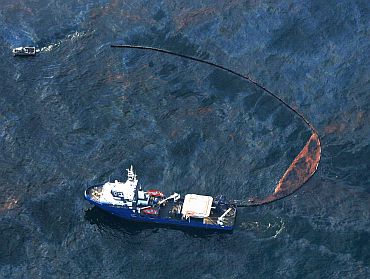

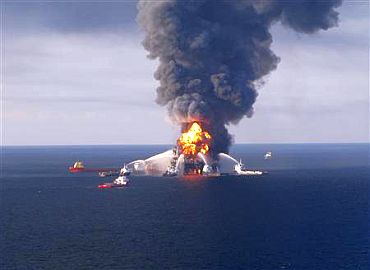
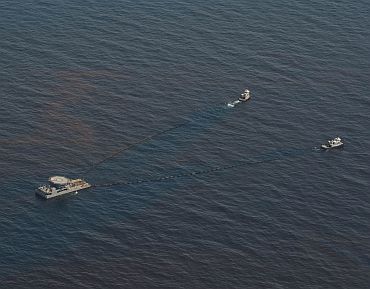
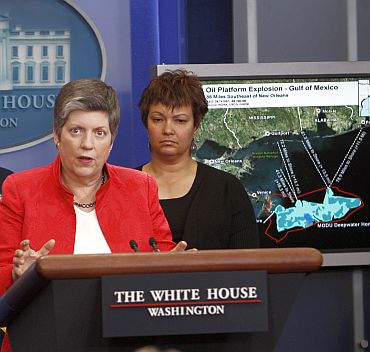
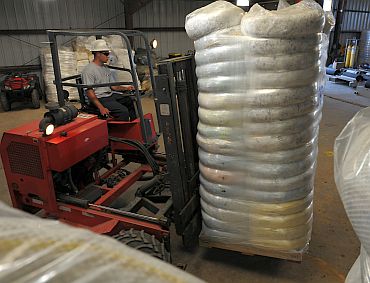
article